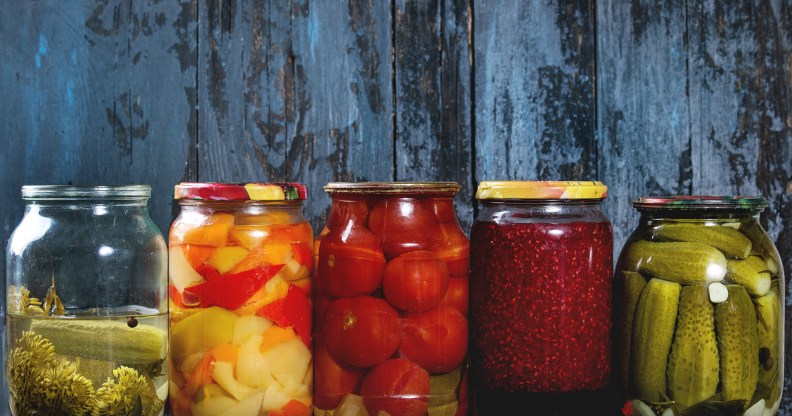This is why the pickle became a symbol of trans rights

Pickled and fermented vegetables. (Natasha Breen/REDA&CO/Universal Images Group via Getty Images)
Two years ago, writer Jennifer Finney Boylan was approached after an event she’d been speaking at in Portland and given an enormous jar of pickles.
“I made you these pickles,” the woman who’d given Boylan the pickles said, sombrely, “in solidarity”.
“How had I missed the fact that pickles had become a symbol of the fight for trans equality?” Boyland asked, in a September 18 New York Times piece.
“I knew all about the trans flag. But I didn’t know anything about pickles,” she said.
If you’re a trans woman who is transitioning or has transitioned, then the need you feel to eat salt to counter the sodium-craving effects of spironolactone, an anti-androgen drug, may well be old news to you.
But if you’re not, then did you know about trans women and pickles? You read that right. Apparently, trans women love pickles because of how salty they are.
Search “trans women and pickles” and you don’t just get memes, you get articles like 18 Pickle Recipes for Trans Women and the People Who Love Them and Cis People: Give Your Pickles To Trans Women.
As trans journalist Samantha Allen explained in a Pride month piece this year for Condé Naste Traveler magazine: “Memes about our affection for fermented cucumbers are so prevalent on social media that some transgender friends have admitted to me that they feel a little excluded because of their ambivalence toward the gherkin.”
Having done some research, Boylan is now fully on board – or is she?
“As a trans activist and writer, I get a lot of pickles these days from readers,” she wrote. “Dilly beans, hot sour cukes, even pickled fiddlehead ferns. I am grateful for every single crunchy, salty, peppery, briny, buttery gift.
“But there are times — to quote Arlo Guthrie — when I don’t want a pickle.
“I mean, yes, they’re crunchy. But if given a choice between a pickle and, say, justice, I’d have to go with the latter.”
Boylan goes on to cite Donald Trump’s trans troops ban; the number of trans women of colour murdered in the US this year (18, so far); the 26 US states where it is legal to fire someone for being trans; and Trump’s rule permitting discrimination against homeless trans folks.
Trans rights in the UK are hardly in a better state: non-binary people are not legally recognised; oft-promised reform of the Gender Recognition Act has been delayed time and time again, creating a hostile media climate where trans rights are debated in the national press, trans people are mocked on primetime TV and trans kids are used as a political football; trans women who report anti-trans discrimination are hounded with violent and misogynistic online abuse; and trans people’s mental health is being eroded by years-long waiting lists for healthcare.
However, when it comes to trans rights in the UK, we must also give an honourable mention to the lobster emoji. While trans women in the UK are presumably also rallying around the pickle, until Big Tech give us a trans-flag emoji, the lobster emoji is also ours.
To explain: author Charlie Craggs started the campaign for a trans flag emoji in 2018, after proposals for a lobster emoji were accepted by Unicode (the organisation that approves new emojis) on the basis that people were suffering “frustration and confusion” at having to use a shrimp or crab emoji instead of a lobster.
“Surely we deserve the same rights you have afforded crustaceans?” Craggs said at the time.
“Lobsters can actually be Gynandromorphs (an organism that contains both male and female characteristics),” she said, adding that the trans community would use the lobster emoji for a symbol “until we get the Trans emoji we deserve”.
On World Emoji Day (July 17), Apple announced 59 new emoji will be released this autumn – including a waffle, a yawning face and a flamingo – but still no trans flag emoji. Or, for that matter, a pickle emoji.

